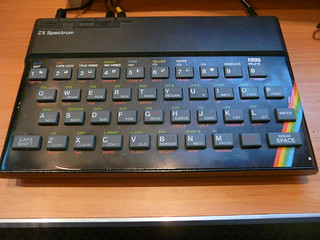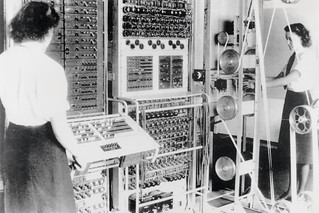David J Longman reviews this new collection of essays on the theme of what the research says about using technology to enhance learning and teaching.
Read MoreQuick look: Baking with Kafka, by Tom Gauld
A great sideways glance at modern life, including our relationships with technnology.
Read MoreReading list! by Terry Freedman
Spreadsheet special, analysis and a prize draw
Read on for a heads-up about what's coming up in the next issue of Digital Education, our free newsletter.
Read MoreThumbnail sketch of The Secret Teacher
Here's an insider's view of what it's like to be a newly qualified teacher in an inner city school.
Read MoreThe Raspberry Pi User Guide 4th Edition
Thumbnail sketch of the Raspberry Pi User Guide
I always dread having to open any kind of manual. For a start, it’s against the natural order of things. (I don’t ask for directions either, even when I’m hopelessly lost.) Secondly, they usually seem to be written for people for whom they are superfluous.
Imagine, then, what a pleasant surprise it was to open this book and discover that it is not only well-structured, but an enjoyable read.
I wouldn’t say it is bedtime reading exactly (mind you, I used to read books on Excel functions and VBA before retiring for the night). However, it is very comprehensive.
For example, if you are interested in setting up your Pi to take time-lapse video, this book takes you step by step through the process.
If you’re serious about pushing your Raspberry Pi to its limits, and even if you’re already pretty familiar with what it can do, this book is a must-have for your bookshelf or workbench.
Raspberry PI User Guide (Amazon affiliate link)
This review was first published in Digital Education, our free newsletter. To find out more, and to sign up, please visit the newsletter page. We use a double opt-in system, and you won't be spammed.
What I've been reading: The Art of People
One of the most fundamental of so-called '21st century skills' is surely knowing how to interact with other people. This book contains some interesting strategies, though I am not sure all of them will work in the UK!
Read MoreDroning on: Review of Drones in Education
What a fascinating idea: using drones as part of the curriculum. This book tells you much of what you need to know.
Read MoreWhat I've been reading: Everyday Sexism
I’ve just read Everyday Sexism [Amazon affiliate link] by Laura Bates. Before I go any further, I suppose I ought to explain why. What does this subject matter have to do with teaching computing and ICT?
Well, I don't think there can be any doubt about the fact that a lot of girls are put off going into computing, whether as a course in school or in their career choices. So I wondered how far the kinds of issues girls face in school, especially in subjects like computing which are seen by too many people as a male preserve, are part of a wider picture.
In many respects this book is pretty depressing. It's bad enough that grown women have to put up with unwanted attention, but children?!
I think girls and women would find the book useful, to help them realise that lots of others experience the same kind of thing. I think boys and men should read it too, to find out how it must feel to be on the receiving end of sexist comments.
One of the things that struck me was the complaint that male teachers say things like, "Come on, you don't want to be beaten by a girl do you?". I can see why girls would feel belittled by that sort of remark, even if it was intended as a lighthearted means of galvanising the boys into making a greater effort.
I remember doing the opposite: saying to the boys in my Computing class that I'd like them to be quiet and let the girls answer, as I'd rather listen to a well-thought out response than some half-baked comment shouted across the room. Was that unacceptable too, do you think?
Most of the book might be described as 'relentless': wave after wave of intrusive and even threatening comments. For me, the best chapter is the last one, because it portrays women as strong and powerful rather than as almost powerless victims.
In this context you might like to read my article, Where are the girls in ICT and Computing?
The book reviewer's desk, by Terry Freedman. For more book reviews, sign up to Digital Education, where this review first appeared.
Like to receive information about my newly-published books, and occasional special offers? Just sign up to my newsletter, Digital Education:
What I've been reading: Thinking Machines
A really engaging exploration into the development of AI and the problems it has had to grapple with.
Read MoreWhat I've been reading: Digital Literacy Skills for FE Teachers
Although this book is aimed squarely at teachers in Further Education, I think it would be a useful resource for school teachers too, and even university lecturers.
Read MoreWhat I've been reading: How to read journal articles in the social sciences
While not specifically concerned with Computing or education technology, this is a very useful book for students undertaking research in journals.
Read More7 books for teachers of computing and ICT
Micro reviews of 7 books. Inspired by a particular branch of "flash fiction", these reviews are just 6 words long! Ideal if you don't have much time to read a full length review, but would like a heads-up on what's out there. However, longer reviews are available if you prefer. Details are in the article.
Read MoreWhat I've been reading: What's yours is mine
This book provides an interesting -- and disturbing -- perspective on the so-called sharing economy.
Read MoreWhat I'm reading: Bounce
What does it take to become an expert? And what can the Computing teacher do about it?
Read MoreWhat I've been reading: Computers, they drive us crazy!
It probably won't have you clutching your sides and gasping for breath, but may bring a smile to your face.
I don't need any excuse to leap into the nearestsecond-hand bookshop when I'm out and about, but if I were forced to provide one, it would be this. You occasionally come across some real gems.
My latest find is “Computers: they drive us crazy!”, by Helen Exley and Bill Stott. Having been published in 2007, this now officially counts as an ancient document. You can try purchasing a new copy from Amazon, if you're prepared to wait until the book is in stock, which could be never. Alternatively, you could pay anything from a penny to almost £800 to receive it very soon if your idea of deferred gratification is having to wait for the tea to brew.
Because of the difficulty of acquiring this book I thought more than twice about writing a review of it. So regard this as an exhortation to visit used book stores and a plea to give cartoon books like this a second glance.
It's a slim volume, consisting solely of wry comments on technology in the form of cartoons. It's thin enough to get through in a single sitting, and while the jokes won't have you visiting hospital with cracked ribs, they will probably bring a smile to your face.
These comments pertain to this particular book, of course, but I think they probably apply to many if not all such books.
Are they good value for money, these books? Strictly speaking, not really. At least, I tend not to buy such things for myself. On the other hand, as a small gift for the geek in your life, or a little extra on top of their main present from you, a book like this can be a nice touch.
Here's the link to this particular book on Amazon, just in case you can find a decently-priced used copy: Computers: They drive us crazy!
What I've been reading: Essays on Teaching, by Bob Blaisdell
A wonderful romp through educational history. If you think our current concerns are new, this book will make you think again.
Read MoreWhat I've been reading: How to lie with statistics, by Darrell Huff
Although this book is over 60 years old, it is remarkably apposite for our times -- and especially in the fields of educational research and assessing pupils' understanding and progress.
Read MoreWhat I've been reading: Teacher Proof, by Tom Bennett
Tom Bennett's book Teacher Proof is, like the curate's egg, excellent in parts. Many of the practices that teachers are encouraged to do have no basis in research (or even common sense, if you ask me). In this book, the founder of ResearchEd takes issue with such matters.
Read More"If you're not one up, you're one down" Photo by Valerie Everett
What I've been reading: The "Upmanship" books
The "upmanship" books of Stephen Potter took a tongue-in-cheek view of education, amongst other things. Although he was writing a generation ago, there is still much in what he wrote to make us smile today.
Read MorePerfect ICT Every Lesson
What I've been reading: Perfect ICT Every Lesson
Perfect ICT every lesson? It's an ambitious title. Does the content deliver the promise though?
Read More





















"As soon as I found out about how to write code, I was hooked. I realised that this was what I should have been doing all along." Anna Shipman, who works for the Government Digital Service, talks about her love of coding.